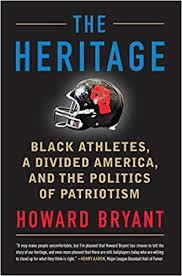The Heritage: Black Athletes, A Divided America, and the Politics of Patriotism
The Heritage: Black Athletes, A Divided America, and the Politics of Patriotism, by Howard Bryant (Boston: Beacon Press, 2018)
“Jackie and Doby and Campy and Newcombe (first African-American players in twentieth century major league baseball) made it easier for me to do my job” – Martin Luther King, Jr.
Book review by Mark Altschuler, a Professor of English at Bergen Community College, Paramus, NJ, and will be presenting “Tris and Lefty: An Unlikely Pair” at the Cooperstown Symposium on Baseball and American Culture, at the Baseball Hall of Fame, Cooperstown, NY, on May 30, 2019.
Any book that gives me a new way of looking at the crucial intersection of race and sport in America is an important book. The Heritage, by Howard Bryant, therefore, is a very important book.
Bryant uses the term “The Heritage” to mean the tradition of African-American sports stars using their high profiles to take stands for social justice. The Heritage, according to Bryant, started with Paul Robeson. Robeson, who was much more than an athlete, paid a heavy price in Jim Crow/McCarthy era America for courageously and fearlessly taking stands. Bryant captures the triumph and the agony of Robeson laying down the foundation of The Heritage.
The book establishes a link between Robeson of the 1940’s and Colin Kaepernick of the current time. Kaepernick has made a sacrifice for his cause (shining a spotlight on police abuse of Black men that often takes place with impunity). Robeson’s sacrifice was extreme, as he essentially spent his declining years under “house arrest” for having the courage to stand up for causes, including many causes on the side of labor and the left.
In between Robeson and Kaepernick, many other Black athletes took stands. Bryant includes people like Muhammad Ali, Jackie Robinson, Jim Brown, and Kareem Abdul-Jabbar in the tradition of “The Heritage.” But three sports stars abandoned that cause. They were “greenwashed” as Bryant calls it. They sought endorsement money and refused to take stands for political and social justice causes. The three betrayers of The Heritage: O.J. Simpson, Michael Jordan and Tiger Woods. Bryant explains how the void created by the greenwashing vacuum was filled by rappers like Chuck D.
Bryant is writing to a divided America and trying to explain facts and history to the Fox News crowd who have tried to shout down LeBron James, a superstar who has stood up for social justice causes, with “Shut up and dribble.” On September 17, 2017, President Donald Trump, using his bully pulpit, took his stand against The Heritage in the form of NFL players kneeling during the National Anthem. Bryant writes that Trump “engaged in a twenty-first century version of McCarthyism by demanding that protestors receive the Robeson treatment. “Wouldn’t you love to see one of those NFL owners, when somebody disrespects the flag, to say, ‘Get that son of a bitch off the field…?’” The words echo Cap Anson’s alleged words in 1887, “Get that n****r off the field,” and then Jim Crow descended on major league baseball for 60 years. Trump has a knack for opening old race wounds in startlingly vile ways.
Bryant explains it was the White power structure that set up the symbolism and gave the Black sports star inherent social and political meaning by holding up Joe Louis, the African-American boxer, as the paradigm of American values versus his German opponent, Max Schmeling, who represented “Nazi” values.
Because I was an avid sports fan from a young age, I thought I already knew much about sports and race. I am also the child of Holocaust survivors. I credit the latter fact for granting me an instinctual feel for the “outsider” sports star. I loved Roberto Clemente from a young age. Clemente, the “double n****r” as he called himself as a Black man and a Puerto Rican, drew me to him for his otherworldly skills and with his outsider dignity that he asserted with every move on and off the ballfield.
It is because I came to this book thinking I was well educated in the matter of sports and race and I learned much more that I find Bryant’s book so compelling. I knew Black athletes took social/political stands, but I did not understand the full context and repercussions until reading this book. The Black star athlete has had a whole set of responsibilities thrust upon him (and her) that each athlete has had to confront with consciousness and conscience. Many did and are still doing so. Bryant’s book gives a context for and pays tribute to this ongoing struggle.

